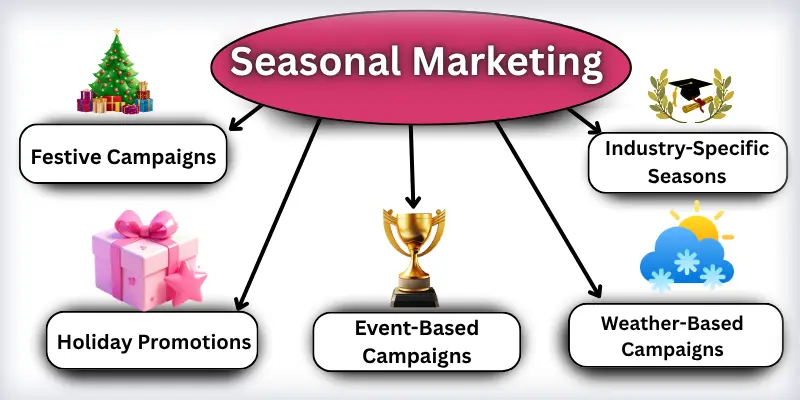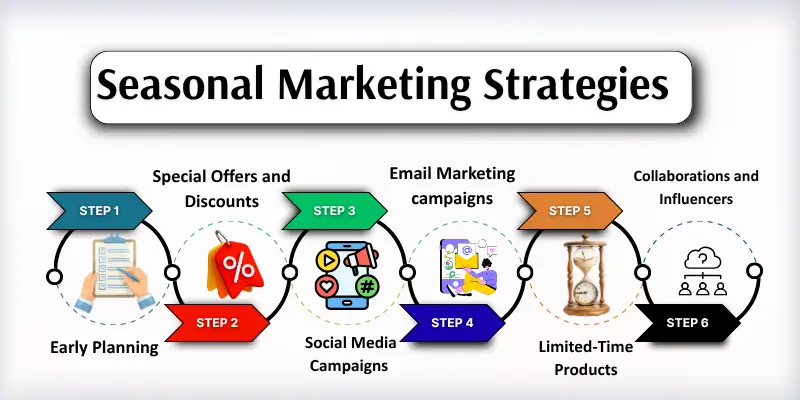Seasonal Marketing
Published: 01 Oct 2025
Did you know that businesses can earn much more during certain times of the year? They use seasonal marketing to reach customers at the right moment. But what exactly is seasonal marketing, and how does it help brands grow? In this article, we will explain what seasonal marketing is in simple terms, using easy-to-understand examples.

What is seasonal marketing?
Seasonal marketing is a marketing strategy that focuses on specific times of the year. Businesses plan campaigns during holidays, festivals, or seasons to attract more customers. It helps brands sell products when people are most likely to make a purchase. Seasonal marketing can include discounts, special offers, or themed promotions. By using this strategy, companies increase sales and make their brand more visible.
Strategies of Seasonal Marketing
Seasonal marketing works best when businesses plan smart strategies. Good strategies help brands reach the right customers at the right time. Here are some seasonal marketing strategies.

1. Early Planning
Planning early helps businesses avoid mistakes and prepare better for the season.
- Plan your campaign weeks or months before the season starts.
- Decide on the products, offers, and promotions in advance.
- Early planning helps avoid last-minute mistakes.
2. Special Offers and Discounts
Special offers attract more customers and increase sales quickly.
- Offer discounts, buy-one-get-one, or gifts.
- Limited-time offers create urgency.
- Customers are more likely to make a purchase when they see special deals.
3. Social Media Campaigns
Social media helps reach more people during the season.
- Use Facebook, Instagram, TikTok, and other platforms.
- Share festive or seasonal posts with attractive images.
- Encourage customers to share posts to reach more people.
4. Email Marketing Campaigns
Emails keep customers informed and interested in seasonal offers.
- Send emails with special offers or seasonal reminders.
- Personalize emails for better results.
- Emails help businesses stay connected with customers.
5. Limited-Time Products
Limited-time products create excitement and urgency.
- Launch products only for a season, like special drinks or gifts.
- People buy more when products are available for a short time.
- It increases brand awareness and sales.
6. Collaborations and Influencers
Working with others helps reach more customers quickly.
- Collaborate with influencers or local businesses.
- Influencers promote seasonal products to their followers.
- Collaborations help attract new audiences fast.
Examples of Seasonal Marketing
Many brands use seasonal marketing to attract customers and increase sales. Let’s see some real Seasonal marketing examples:
1. Festive Campaigns:
Festive campaigns make shopping fun and exciting during festivals:
- Coca-Cola Christmas Campaign: Coca-Cola creates bottles with Santa and special ads. People love collecting them.
- Starbucks Seasonal Drinks: Pumpkin spice latte is available only in autumn. It creates excitement and urgency.
- Eid or Diwali Offers: Shops offer gift packs, discounts, and colourful ads.
Make your product look festive and fun.
2. Holiday Promotions:
Holiday promotions boost sales during holidays, when people are looking for gifts or celebrating. For more tips, check out our detailed guide on Holiday Marketing Ideas.
- Valentine’s Day Gifts: Chocolates, flowers, and personalized gifts sell fast.
- New Year Sales: Clothes, gadgets, and home items get big discounts.
- Local Holiday Offers: Independence Day or national holiday deals attract local customers.
Use special offers to attract more buyers.
3. Event-Based Examples:
Event-based marketing works during big sales or events:
- Black Friday Deals: Stores offer huge discounts on electronics and fashion.
- Cyber Monday Sales: Online stores give special deals and free shipping.
- Sports Event Campaigns: Merchandise and limited-time offers create excitement.
Match products with events to increase sales.
4. Weather-Based Examples:
Weather-based marketing helps sell products people need in certain seasons:
- Summer Drinks & Ice Cream: Summer-only promotions increase sales.
- Winter Jackets & Heaters: Winter campaigns encourage people to buy cold-weather items.
- Monsoon Products: Raincoats, umbrellas, and boots sell faster.
Show how your product solves seasonal problems.
5. Industry-Specific Seasons:
Some industries have special peak seasons that sell more products:
- Back-to-School Products: Books, bags, and stationery are popular in August-September.
- Wedding Season Items: Jewellery, dresses, and decorations get more buyers.
- Tourist Season Offers: Travel packages and hotels attract holiday travellers.
Highlight popular products and trends for the season.
Benefits of Seasonal Marketing
Seasonal marketing helps businesses grow and reach the right customers. Here are the main benefits:
| Advantages |
|---|
|
Challenges of Seasonal Marketing
Seasonal marketing is beneficial, but it also comes with some challenges that businesses must consider.
| Disadvantages |
|---|
|
Conclusion
So, friends, it’s time to wrap up! We have covered seasonal marketing, including its strategies, examples, and benefits. In my opinion, every business should carefully plan its seasonal campaigns to attract more customers and boost sales. Start small, focus on the right season, and make your campaigns creative. Don’t wait—apply these tips today and watch your business grow!
FAQs about seasonal marketing
Here are the top questions people usually have about seasonal marketing.
Seasonal marketing has different types, like festive campaigns, holiday promotions, event-based campaigns, weather-based campaigns, and industry-specific seasons. Each type focuses on a special time or event to attract customers.
Yes! Online stores can use social media posts, emails, and special offers. Customers love limited-time deals and seasonal products. Even a small online campaign can bring more buyers.
No! Seasonal campaigns can also focus on weather changes, back-to-school periods, or industry-specific seasons. Any time when customers have special needs works. It’s about timing your products well.
Yes! Beginners can start with small campaigns like social media posts or email offers. Learning from each campaign helps improve the next one. Over time, they can handle bigger campaigns easily.
Look at your products and customers. Choose a season or event when your products are most needed. For example, winter clothes sell best in cold months.
Track sales, website visits, and customer engagement during campaigns. See which offers or products worked best. Use this data to plan better campaigns next time.

- Be Respectful
- Stay Relevant
- Stay Positive
- True Feedback
- Encourage Discussion
- Avoid Spamming
- No Fake News
- Don't Copy-Paste
- No Personal Attacks

- Be Respectful
- Stay Relevant
- Stay Positive
- True Feedback
- Encourage Discussion
- Avoid Spamming
- No Fake News
- Don't Copy-Paste
- No Personal Attacks
